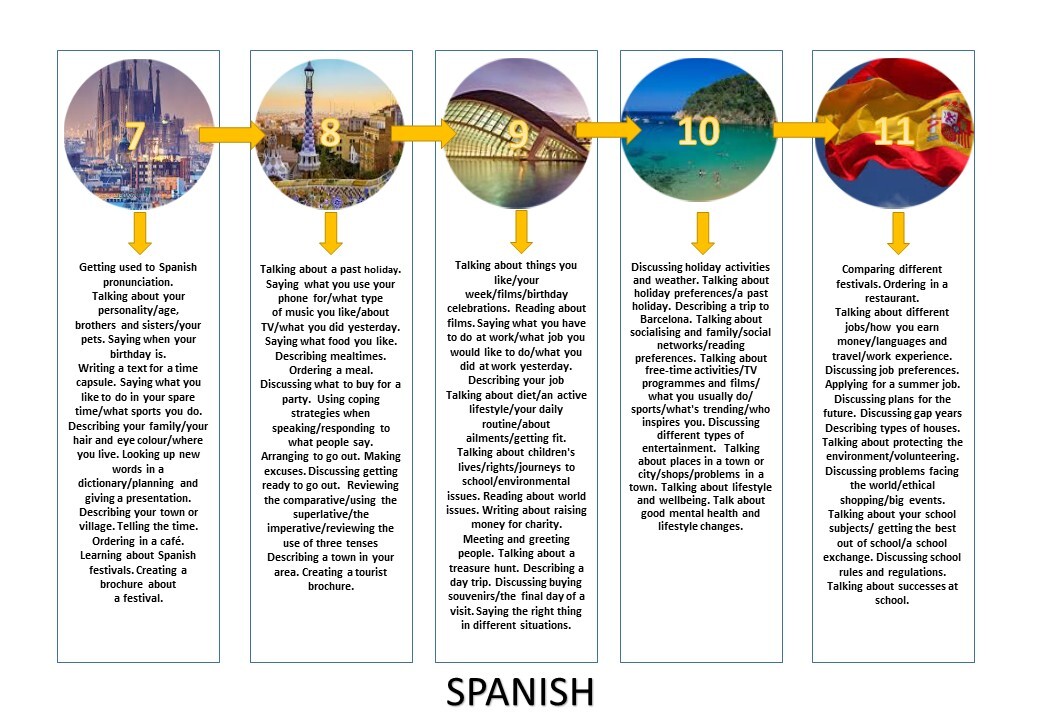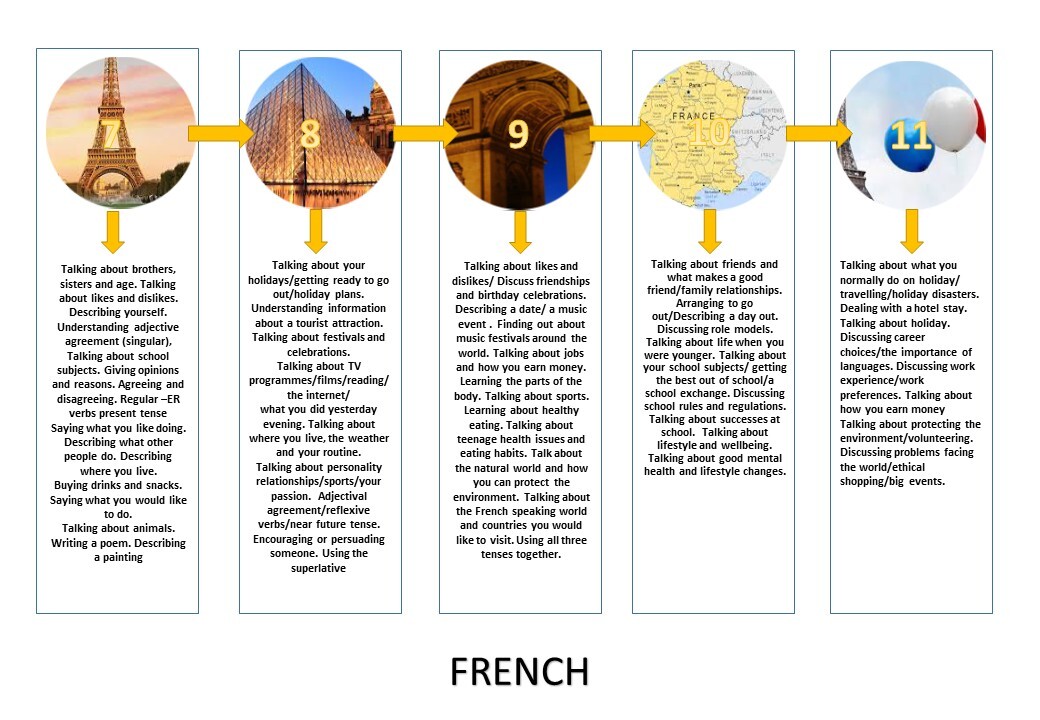- Home
- Secondary
- Subject Information
Modern Foreign Languages
BackModern Foreign Languages at Tabor Academy
Our aim is to encourage a love of languages and support global communication and understanding. We presently offer French and Spanish, which was introduced in 2019.
We actively promote engagement with the language studied through interactive teaching, immersion and exposure in class, facilitating pupils to build competence across the four language skills of listening, speaking, reading and writing. This approach supports achievement at GCSE and, hopefully, drives pupils to combine a positive language learning experience at school with any future passions of travelling, linguistics, employment and any other elements beyond the confines of a classroom.
Lessons and trips abroad support our aim of providing an immersive environment and promoting languages outside of a classroom climate. This year we have led very successful trips to Normandie in France and Barcelona in Spain. The trips are a great opportunity for students to practise the language and immerse themselves into the culture. It is a very enriching experience and a great opportunity to develop real-life skills.
The members of the MFL team aim to use target language in their teaching, and encourage the pupils to communicate in French or Spanish too. We are always open to language ideas and experiences that will promote a love of learning, languages and life skills and communication.
Aims
We aim to provide a fun and positive environment that engages students in developing their language learning skills. Our aim is to make learning enjoyable and to allow all of our students to experience other cultures through active learning, an engaging curriculum and research projects.
With skilled linguists in the department, we are committed to encourage pupils to use the target language with each other in pair or group work and to ensure that pupils are hearing authentic language each time they are in the MFL classroom. Within the MFL classroom we consistently emphasise that it is okay to make mistakes. We believe where pupils learn is in deciding how they move on from these errors. This open environment allows pupils to grow in confidence and not worry about speaking out in front of their peers, and to enjoy broadening their cultural references and in cultural understanding.
Our aims are to;
- Promote a love of languages
- Provide pupils with an insight into the doors that Languages can open
- Deliver a cultural understanding of the French and Spanish-speaking world
- Encourage interaction with languages through immersion in class and productive activities
- Grow pupil confidence and creativity in effective communication in French or Spanish
- Support and nurture progress and achievement through the carefully structured MFL syllabus
- Share our expertise, passion and open-mindedness involving French and Spanish
KS3 French
KS3
Overview of Curriculum/SOW
Curriculum MAP
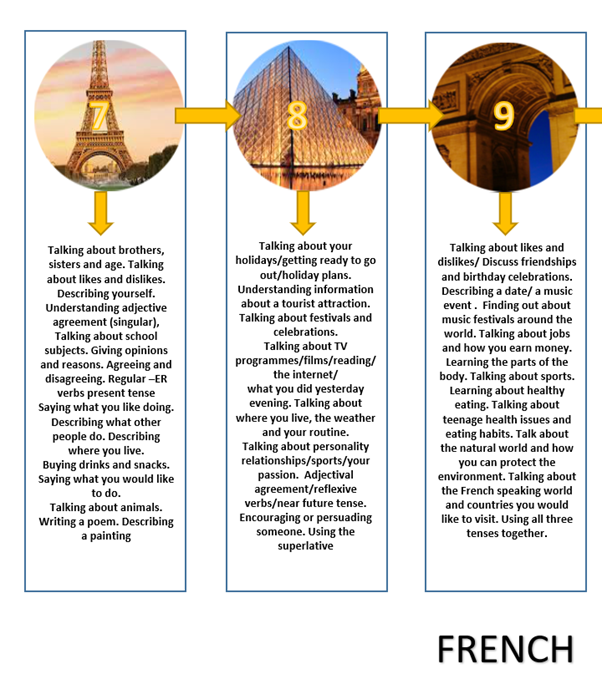
Year 7
WHAT YOU WILL LEARN - YEAR 7 FRENCH
All students will start off completing an introduction to language learning and will then progress on to a variety of topics to guide them through the foundations of French language.
During the autumn term they will focus on introducing themselves as well as talking about school. During spring term they will cover family relationships and saying what they do in their free time and expressing opinions. In the summer term students will learn to describe their town and local area.
During the Autumn term, the following topics will be covered:
Module 1: La rentrée
To get pupils introducing and talking about themselves. This module also covers any content that pupils might have done in KS2 (numbers, days and months, alphabet, etc.) and introduces pupils to the key French sounds which are revisited throughout the year in Pronunciation features.
Module 2: En classe
To continue to develop what pupils can say about themselves and their use of verbs. To allow pupils to express and justify their opinions using a range of opinion verbs. Also an opportunity for pupils to learn about schools in France as well as about Christmas in Francophone countries to coincide with the end of the autumn term.
During the Spring term, the following topics will be covered:
Module 3: Mon temps libre
To continue to develop what pupils can say about themselves and their use of verbs and adjectives. To allow pupils to express more opinions. Pupils also have the opportunity to learn about different sports in Francophone countries.
Module 4: Ma vie de famille
To expand pupils’ use of verbs into the 3rd person singular and plural and 1st person plural forms. Pupils learn about home-life in Francophone countries as well as about Bastille Day celebrations.
During the Summer term, the following topics will be covered:
Module 5: En ville
To give pupils the opportunity to learn transactional language (in a café) and introduce the verb “aller” ahead of teaching the near future tense. Pupils learn about popular French snacks and drinks, and they also have the opportunity to explore Paris.
YEAR 8 FRENCH
During the Autumn term, the following topics will be covered:
Module 1: Vive les vacances!
To allow pupils to talk about the summer they have just had and to introduce them to the perfect tense and using the perfect and present tenses together.
Module 2: J’adore les fêtes!
To develop what pupils can say about their lives and their likes/dislikes and expand their transactional language in context of buying food at a market. To allow them to revise the present and near future tenses and continue to practise the perfect tense. Pupils learn about festivals and celebrations in the Francophone world and they are introduced to traditional French cuisine.
In the Spring term, the following topics will be covered:
Module 3: À loisir
To allow pupils to express their opinions around TV and digital technology and further develop their transactional language in context of arranging to go out. To introduce pupils to using three tenses together. Pupils also learn about leisure activities in different Francophone countries.
Module 4: Le monde est petit
To continue to develop what pupils can say about their lives and how they express and justify their opinions. To develop their use of different persons of the verb and to introduce modal verbs as well as reflexive verbs in context of daily routine. Further practice with three tenses. Pupils learn about geographical aspects of France and Francophone countries as well as about famous French painters and their works of art.
In the summer term, the following topics will be covered:
Module 5: Le sport en direct
To continue to develop what pupils can say about their lives and their likes/ dislikes, including comparatives. To introduce the imperative for asking directions and give further practice with transactional language in context of talking to the doctor. Pupils also learn about some famous sportspeople in the Francophone world.
Year 9
All French and Spanish topics have a focus on listening, speaking, reading and writing, increasing vocabulary and knowledge and application of grammar. The Year 9 course aims to widen pupils' communicative skills through the acquisition and consolidation of new or previously learnt language. The course book and SoW that we use meet the needs of the range of pupils in Year 9. They are preparing pupils for GCSE style questions and exam papers through a varied range of carefully planned lessons.
YEAR 9 FRENCH
In Year 9, students of French will cover the following topics each term:
Autumn Term:
Module 1: Mon monde à moi
Pupils able to talk about their lives and their likes/dislikes using a wider variety of language. Pupils revise all three main tenses (present, near future and perfect).
Module 2: Projets d’avenir
Pupils able to talk about their plans and hopes for the future. Pupils are introduced to the (simple) future tense and go on to practise and consolidate their knowledge of three tenses, asking and answering questions in context of an interview with French inventor, Bertin Nahum.
Spring Term:
Module 3: Ma vie en musique
To allow pupils to express their musical tastes, justifying their opinions with reasons. There is an introduction to the imperfect tense in context of comparing life past and present. Pupils consolidate their knowledge of the present, perfect and imperfect tenses.
Module 4: Le meilleur des mondes
Pupils continue to develop their command of the present, perfect and imperfect tenses, as well as being introduced to the conditional in context of creating a better world. Pupils are introduced to, and practise using, superlatives. Further practice with three time frames (present, past, conditional).
Summer Term:
Module 5: Le monde francophone (Grammaire)
Further practice and consolidation of key grammatical structures and tenses. Pupils operate in three time frames using a wide variety of tenses in context of travel and popular culture in the Francophone world. Moreover, there is an opportunity for pupils to practise transactional language during the formal register.
KS3 Spanish
KS3 Spanish
Overview of Curriculum/SOW
Curriculum MAP
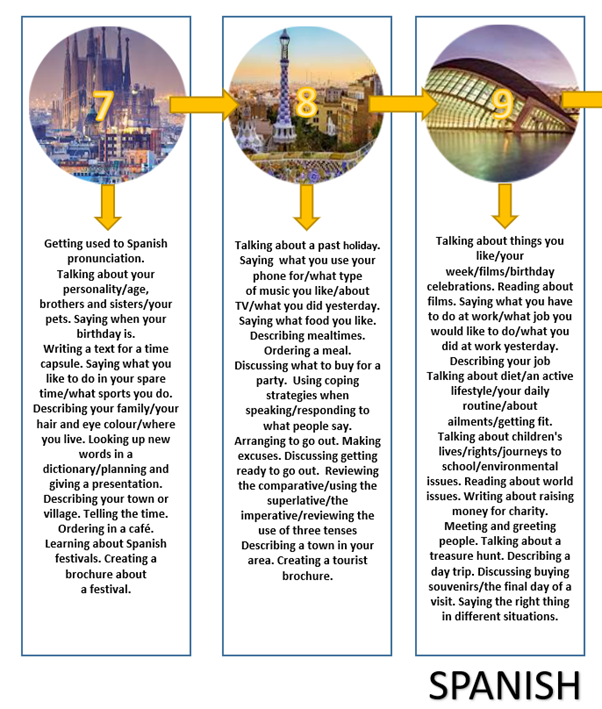
YEAR 7 SPANISH
All students will start off completing an introduction to language learning and will then progress on to a variety of topics to guide them through the foundations of Spanish language.
During the autumn term they will focus on greetings, introducing and describing themselves as well as what they do in their free time. During spring term, they will talk about school and also describe their family. In the summer term students will cover shops, presenting their local area and home.
During the Autumn term, the following topics will be covered:
Module 1: Mi vida
To get pupils introducing and talking about themselves. This module also covers any content that pupils might have done in KS2 (numbers, colours, alphabet, etc.) and introduces pupils to the key Spanish sounds which are revisited throughout the year in Pronunciation features.
Module 2: Mi tiempo libre
To continue to develop what pupils can say about themselves and their use of verbs. To allow pupils to express opinions (me gusta + verb first as easier). Moreover, an opportunity for pupils to learn about Christmas in Spain to coincide with the end of the Autumn term.
During the Spring term, the following topics will be covered:
Module 3: : Mi insti
To continue to develop what pupils can say about themselves and their use of verbs and adjectives. To allow pupils to express more opinions. Pupils also have the opportunity to learn about schools in Spain and education in Central America.
Module 4: Mi familia y mis amigos
To expand pupils use of verbs into 3rd person singular and plural. Pupils also learn about the carnival in Cadiz and the famous Spanish painting, Las Meninas.
During the Summer term, the following topics will be covered:
Module 5: Mi ciudad
To give pupils the opportunity to learn transactional language (in a café) and introduce the verb ir ahead of teaching the near future tense. Also an opportunity for pupils to learn about typical tapas dishes.
YEAR 8 SPANISH
During the Autumn term, the following topics will be covered:
Module 1: Mis vacaciones
To allow pupils to talk about the Summer they have just had and to introduce them to the preterite tense and using the preterite and present tenses together.
Module 2: Todo sobre mi vida
To continue to develop what pupils can say about their lives and their likes/ dislikes, including comparatives. To allow them to revise the present tense and continue to practise the preterite.
In the Spring term, the following topics will be covered:
Module 3: ¡A comer!
To allow pupils to express likes/dislikes around food and learn transactional language relating to eating out (including usted(es)). To introduce pupils to using 3 tenses together. Pupils are also shown some typical Spanish menus and learn about traditional foods of Central and South America.
Module 4: ¿Qué hacemos?
To introduce me/te gustaría in context of arranging to go out and reflexive verbs in context of getting ready to go out. Further practice with three tenses.
In the Summer term, the following topics will be covered:
Module 5: Operación verano
To develop use of comparative and introduce the superlative in context of holiday homes/activities. To introduce imperative for asking directions. Pupils also learn about the Spanish holiday destination of Mallorca.
Year 8
Grammar is taught and reviewed as an on-going priority in lessons. The new GCSE has a strong focus on grammar so students need to be well prepared. Translation (both ways) is an integral part of the lesson by lesson teaching as it features in the new GCSE together with the photo description task. It is another way of reinforcing grammar as well as vocabulary. Pupils are also encouraged to develop a rich cultural appreciation of the French-speaking world through exposure to materials such as short stories, poems, films, art and music. Each unit of work is approximately 12 lessons, based on a 2 lesson per week basis.
YEAR 9 SPANISH
In Year 9, students of Spanish will cover the following topics each term:
Autumn Term:
Module 1: Somos así
Pupils able to talk about their lives and their likes/dislikes using a wider variety of language. Pupils revise all three main tenses
Module 2: ¡Oriéntate!
Pupils able to talk about their hopes for the future, to coincide with options evenings time of year. Emphasis put on the importance of languages for future careers.
Spring Term:
Module 3: En forma
To allow pupils to discuss the importance of a healthy lifestyle. Introduction to talking about wider issues and an opportunity to introduce some new verbs.
Module 4: : Jóvenes en acción
An opportunity ahead of GCSE to talk about wider, global issues and to develop language for expressing their beliefs. Also an introduction to the imperfect. Plus opportunity to read two poems by the Spanish poet, Gloria Fuertes and a traditional Peruvian folk tale.
Summer Term:
Module 5: Una aventura en Madrid
To develop language, they would need for arriving in Spain and to learn more about Spain’s capital city. Moreover, an introduction to the simple future.
Grammar is taught and reviewed as an on-going priority in lessons. The new GCSE has a strong focus on grammar so students need to be well prepared. Translation (both ways) is an integral part of the lesson-by-lesson teaching as it features in the new GCSE together with the photo description task. It is another way of reinforcing grammar as well as vocabulary. Pupils are also encouraged to develop a rich cultural appreciation of the French and Spanish-speaking world through exposure to materials such as short stories, poems, films, art and music.
EXTRA CURRICULAR
In order to support even further the pupils’ learning, the following extra-curricular activities are offered in our Department:
Homework club: you can get help with your MFL homework at the homework club at lunch times.
Intervention:
It is aimed mostly at KS4 students, this informal space allows students to go over and consolidate their learning either at lunchtime or after school. These sessions have been particularly successful this year where students have highlighted the benefits of having teachers available to answer their questions and clear any misunderstanding they might have had.
Google Classroom: KS3 & 4 students benefit from the use of this fantastic and exciting Managed Learning Environment, an online school building with different rooms inside. Students can only access Google Classroom using their personal username and password and are only allowed to see rooms they have been made a member of.
KS4
KS4
From 2024, the DfE has announced that GCSE students studying French, and Spanish will be assessed differently. These changes are set to affect students currently in Year 10 and below.
This is aimed at making languages ‘more accessible for students’, the new specifications could significantly impact MFL exams from 2026 onwards.
Here are some of the most significant changes to the MFL GCSE curriculum:
- Subject content will mostly focus on vocabulary, grammar, and phonics
- Comprehension-oriented questions and rubrics will be written or asked in English
- Assessment objectives are changing, with weighting to be consolidated into a joint evaluation to reflect the importance of all four language skills
- The new curriculum will encourage students to use their language skills interchangeably
- The new assessment will involve a reading-aloud task to test students’ sound-symbol correspondences. They will also have to participate in dictation exercises
- Students will be assessed on between 1,200- and 1,700-word families, based on their tier of study. A minimum of 85 per cent of these will be chosen from the 2,000 most commonly used words in a language.
Edecxel’s Assessment at Glance
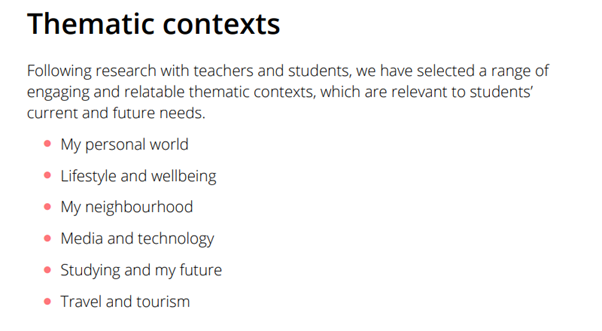
GCSE EXAM AT A GLANCE
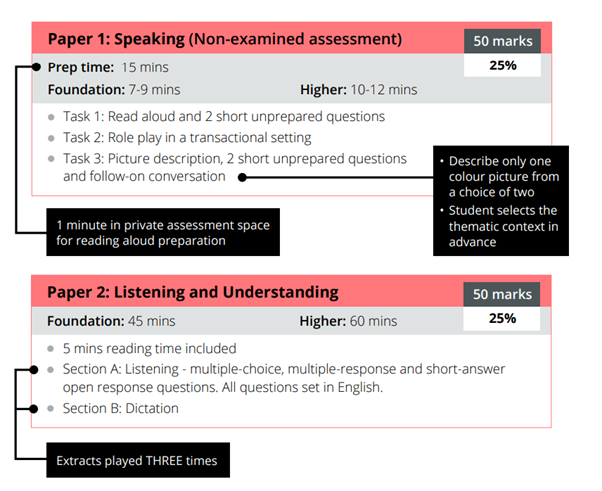
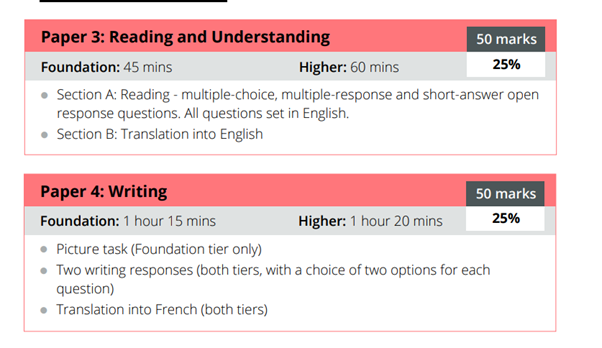
Future Careers For Modern Languages
Language skills can be used in almost any career, and particularly in businesses that trade internationally.
Some modern language graduates work on a self-employed basis as interpreters or translators. However, many others are employed by companies who trade or offer services internationally, or to non-English speaking customers and suppliers.
Secondary education teaching professional is the top job held by graduates in employment in the UK. Other jobs in the top ten include marketing associate professional, PR professional, business sales executive, admin, human resources and industrial relations officer, business and related associate professional, business and financial project management professional and finance investment analyst and adviser.
Useful Links
Support for learning
Websites to support learning, provide pupils with a reference guide for vocabulary and grammar and add an interactive element to language acquisition and practice. These are just a few examples and ideas to get you started;

KS3
French:
Spanish:
KS4
French:
Revision guides
French:
- CGP GCSE French revision guide:
https://www.cgpbooks.co.uk/secondary-books/gcse/languages/french/fer41-gcse-french-edexcel-revision-guide-for-t - Studio French GCSE Edexcel revision guide:
https://www.pearsonschoolsandfecolleges.co.uk/Secondary/ModernLanguages/French14-16/StudioEdexcelGCSEFrench/ISBN/Revision/ReviseEdexcelGCSE2016FrenchRevisionGuide.aspx - https://www.pearsonschoolsandfecolleges.co.uk/secondary/subjects/modernlanguages/viva-pearson-edexcel-gcse-spanish/revise-pearson-edexcel-gcse-9-1-spanish-revision-workbook-second-edition#products
Supporting Students Outside the Classroom
Supporting Students Outside the Classroom
- Linguascope
- Bitesize
- Seneca Learning
- Google Classroom
- Wordreference.com
Equipment

Please purchase a bilingual dictionary in the language you are studying.
Extra- Curricular
Clubs to support pupils learning and offer extra language opportunities
- Monday: French GCSE speaking 1:30-2:00
- Monday: Spanish film and games club 1:30-2:00
- Thursday: French film and plays club 1:30-2:00


English as an Additional Language (EAL)
At Tabor Academy, we are committed to providing a welcoming, inclusive environment where every student—regardless of background or language—can thrive.
Our EAL provision plays a vital role in upholding our values of community, respect, and excellence, ensuring that students who are new to English or the UK are supported to feel safe, confident and empowered as they begin their educational journey with us.
We recognise that students learning English as an additional language bring with them rich cultural heritage and diverse perspectives, which we celebrate as a strength that enriches the life of our school.
Supporting Your Learning – Joining us in Year 7 (Key Stage 3)
On arrival, all Year 7 students undertake the Cognitive Abilities Test (CATs) and screenings for dyslexia and dyspraxia to ensure that there are no special educational needs around reading, writing and numbers. We also assess proficiency in listening, speaking, reading and writing, using the DfE proficiency codes (A–E). These assessments help us to personalise support and make timely decisions regarding student timetables.
For students assessed at Proficiency Code A, we provide daily 1:1 language tuition—initially for two weeks—to lay the foundations for English language learning and to support cultural orientation and integration into the British education system Languages Centre: A Hub of Belonging and Growth.
A similar process is in place for students joining us after Year 7 official starter date.
Our SEN department is central to the delivery of EAL support and reflects the Tabor Academy values by fostering ambition, belonging, and academic excellence. It is built around five key aims:
- A structured, language-rich learning environment
- A personalised induction and integration pathway
- A clear model for tracking language acquisition and academic progress
- A well-resourced teaching and independent learning base
- A social and community-focused space for students and their families
Our EAL club is open during break and lunch times for additional academic or wellbeing support. It offers a safe, supportive setting where students can build friendships, develop language skills, and grow in confidence.
Working with Students
We support EAL students in a range of flexible and responsive ways, depending on their needs and stage of language development:
- 1:1 or small group tuition focusing on vocabulary, grammar and comprehension
- Regular assessment of the four language skills (listening, speaking, reading, writing) using the Bell Foundation Assessment Framework
- In-class support, enabling EAL students to access the curriculum alongside their peers while being supported by skilled EAL staff
- Online revision tools to support learning, which can be used from home to support learning.
This approach ensures students are not only developing fluency but also embedding their learning in context, supporting academic and personal success.
Homework Club
Our Homework Club runs after school and lunchtime in the library, providing a quiet, well-supported environment for students to complete homework or seek additional help. Please speak to a member of the library if you would like to attend.
Break and Lunchtime Provision
The SEN department is open at break and lunch for informal, supervised opportunities to practise conversational English in a relaxed and friendly environment. These sessions help to build fluency and confidence while promoting positive peer relationships
Useful links to support your child at home:
Duolingo - The world's best way to learn a language
Careers Where Multilingualism Is a Strength
- Interpreter or Translator
- Diplomatic or Foreign Service roles
- International Business or Trade
- Airline Cabin Crew or Airport Operations
- Travel & Tourism
- Immigration or Border Control Services
- Humanitarian Aid / NGOs
- Journalism or International Correspondence
- Teaching English as a Foreign Language (TEFL)

